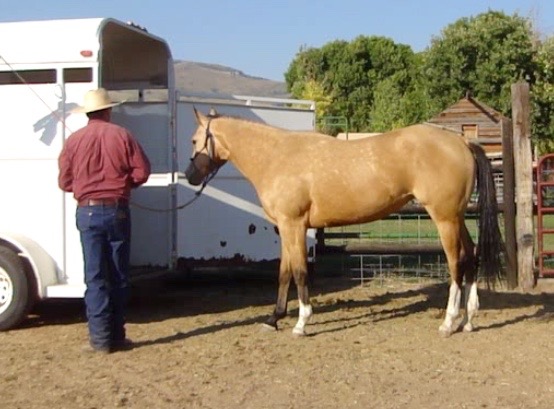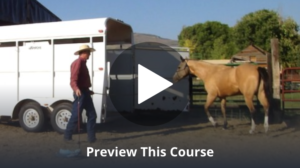
Recognizing When Your Horse Is Ready To Load In The Trailer
I am going to share the first of four steps that changed trailer loading for me forever. In 23 years of starting colts, I have never had a horse I couldn't get to willingly load into a horse trailer. Some horses take longer than others but it has worked on every horse so far. My answer when asked how I accomplish this is simple. "I don't try to load horses that don't want to go into the trailer. I prepare them so that they want to go into the trailer." Accomplishing this is also simple once you understand what to look for.
The first step is being able to recognize when the horse is really considering the trailer as an option and when he is not. I believe this is the most overlooked principal of trailer loading. It is like the old saying, 'A man convinced against his will is of the same opinion still.' Horses are no different, they either want to go in the trailer, or they don't. Trailer loading problems start with trying to load a horse that doesn't want to load up. Yet, people try to load horses that don't want to be near a trailer, let alone in one.
I have identified three reasons why horse owners try to load horses that aren't ready. First, they are in a hurry and haven't allowed enough time to prepare the horse. Second, human emotions such as anger and frustration get in the way and impede good judgement. Third, when a horse won't load up, it is easy to take it personally and enter into a power struggle with the horse. It is important for the human to take responsibility of the situation. The horse isn’t the one to blame for not going in the trailer.
The simple fact that you're having trouble getting your horse to load is the biggest indication that he isn't prepared. The attitude of your horse as you approach the trailer will tell you if he is ready. Does he have the same look that he has when he wants to be with another horse, or heading to feed? Or does his expression reflect that he is headed to danger? Watch his expression and also his movement. Is he moving freely by the trailer or does he stop and refuse to move, back away, or try to leave?
Recognizing these signs is the first step to successful trailer loading. I will discuss the second step, building communication, in the next blog.
Trailer Loading Your Horse
Mario Johnson • Horse Trainer, Colt Starter, Rawhide Braider
Willing Communication Gets Your Horse In The Trailer


